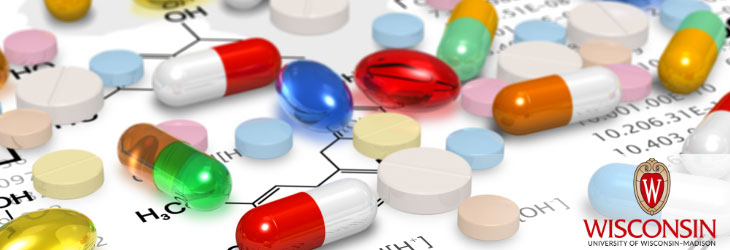Therapeutics & Vaccines

Non-Natural Peptides for Treating Diabetes
WARF: P130310US02
Inventors: Samuel Gellman, Lisa Johnson, Alan Attie, Alan Saghatelian, Mark Keller
The Wisconsin Alumni Research Foundation (WARF) is seeking commercial partners interested in developing peptide analogs of GLP-1 with prolonged effects in vivo.
Overview
Diabetes mellitus continues to be a chronic public health issue despite the availability of injectable insulin since the 1920s. Finding alternative treatments is the subject of intense research. In recent years, efforts have focused on a potent anti-hyperglycemic hormone called glucagon-like peptide-1 (GLP-1).
GLP-1 is the natural agonist (activator) of a receptor found on the surface of pancreatic beta cells. Activation of this receptor promotes insulin release and survival of the beta cells. Such properties are attractive for treating type 2 diabetes. Unfortunately, GLP-1 is rapidly degraded by peptidase enzymes in the body. In fact, its half-life is less than two minutes.
There is interest in creating synthetic GLP-1 peptide analogs that resist degradation.
GLP-1 is the natural agonist (activator) of a receptor found on the surface of pancreatic beta cells. Activation of this receptor promotes insulin release and survival of the beta cells. Such properties are attractive for treating type 2 diabetes. Unfortunately, GLP-1 is rapidly degraded by peptidase enzymes in the body. In fact, its half-life is less than two minutes.
There is interest in creating synthetic GLP-1 peptide analogs that resist degradation.
The Invention
UW–Madison researchers have developed a new approach for designing GLP-1 receptor agonists that could be used to treat diabetes. The agonists retain GLP-1-like function but have prolonged activity in vivo.
The method includes strategically replacing native α-amino acid residues with conformationally constrained β-amino acid resides. The new α/β peptides mimic GLP-1 in terms of interacting with pancreatic beta cells and regulating blood glucose levels. The peptides are less susceptible to enzyme degradation due in part to the multiple β residue replacements.
The method includes strategically replacing native α-amino acid residues with conformationally constrained β-amino acid resides. The new α/β peptides mimic GLP-1 in terms of interacting with pancreatic beta cells and regulating blood glucose levels. The peptides are less susceptible to enzyme degradation due in part to the multiple β residue replacements.
Applications
- Non-natural peptides for potentially treating diabetes and hyperglycemia
Key Benefits
- Longer half-life in vivo than natural GLP-1
- Glucose-lowering effects may compete with drugs currently on the market.
Stage of Development
The researchers have assessed protease resistance in vitro, the effects of the peptide on glucose-dependent insulin secretion in cell culture, and performed a glucose tolerance test in mice.
Additional Information
For More Information About the Inventors
Related Technologies
Related Intellectual Property
Tech Fields
For current licensing status, please contact Rafael Diaz at [javascript protected email address] or 608-960-9847